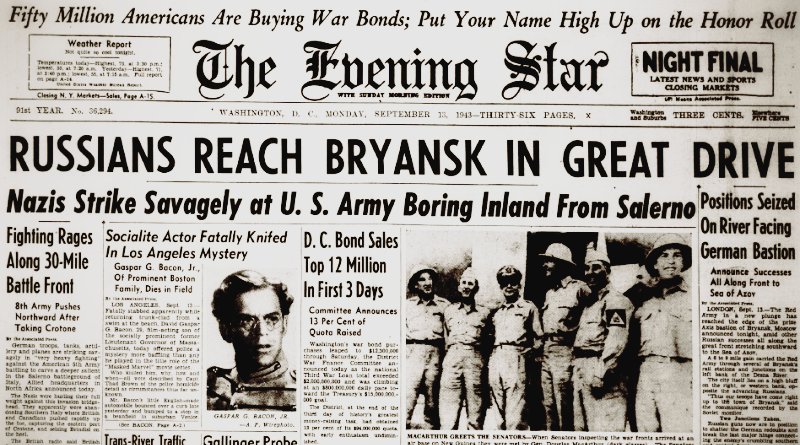World War II Chronicle: September 13, 1943
Click here for TODAY’S NEWSPAPER
A story on the bottom of the front page cites a German radio broadcast that the Germans have captured deposed Italian dictator Benito Mussolini in a daring paratrooper raid. British intelligence has low confidence in this report… Gen. John J. Pershing, the celebrated commander of the American Expeditionary Force, is celebrating his 83rd birthday today at Walter Reed Hospital (see page six)…
George Fielding Eliot column on page eight… Sports on page 12.
Roving Reporter by Ernie Pyle
Ernie Pyle has returned to this country for a rest. The following was written before his departure from the Mediterranean war zone.
SOMEWHERE IN SICILY — As the Sicilian campaign drew to an end some weeks ago and we went into our rest bivouac, rumors by the core popped up out of thin air and swept through the troops like a forest fire.
No. 1 rumor in every outfit, of course, was that ships already were awaiting to take them back to the States. That one was so old I don’t think half the men will believe it’s true when the war ends, and they actually do start back.
Other rumors had them staying in Sicily as occupation troops, going to England, going to China, and — ugly thought — going right on as the spearhead of the next invasion.
Some people worry about such rumors that constantly sweep our armies, but personally I think they are harmless. When the Army doesn’t have women, liberty, ice cream, beer or clean clothes, it certainly has to have something to look forward to, even if only a faint hope for some kind of change that lies buried in an illogical rumor.
In fact, I don’t know how we would endure without our rumors.
A few days after the Sicilian campaign ended I went back to Palermo to get in touch with what we jokingly call Civilization.
The Army had commandeered several hotels, and I was put up in a dungeon-like cell that overlooked an alley inhabited with a melee of Sicilians who screamed constantly and never cleaned up anything.
They apparently had the concession for raising and furnishing the hotel with mosquitoes, for they came floating up from that alley like smoke. It tied mosquito netting over my bed, and just before climbing in for my first repose off the ground in five weeks, I decided I had better inspect the lovely white sheets.
My haul was three bedbugs and a baby scorpion. Civilization, she is wonderful.
In the field most of us had mosquito nets. The mosquitoes weren’t really so bad in the country but there were just enough to keep you worried about malaria. We strung up nets over our bedrolls in scores of fashions — all the way from tying them to tree branches, to hanging them over Italian aluminum tent poles stuck in the ground.
The climate was ideal for our Sicilian campaign. The days were hot, but certainly nothing approaching the summer heat of Kansas or Washington, D.C.
Down on the coast the nights were just right for sleeping with one blanket. Up in the mountains, it actually got cold at night. There wasn’t a drop of rain. The Army engineers still thank Allah every hour for the dryness because rains would have washed out their by-passes around the blown bridges and made the movement of our vehicles almost impossible.
Because of the climate, nobody uses tents any more for sleeping. You just throw your blankets down on the ground and sleep in the open. You never realize until you sleep under the open skies how many shooting stars there are at night.
And one night, there was a frightening red glow in the East which lasted only a couple of seconds. It colored the whole eastern heavens. It was neither flares nor gunfire, so it must have been Mount Etna, boiling and snarling.
In the Sicilian villages we passed through, the local people would take little embroidered cushions out of their parlors and give them to our soldiers to sit on while resting. It was funny to march with a sweaty infantry company, and see grimy doughboys with pink and white lacey cushions tucked under their harness among grenades, shovels and canteens.
The hazelnut and almond season came in just as the campaign ended. Practically every camp had a hundred-pound sack of almonds lying on the ground where the soldiers could just sit and crack the nuts on rocks and gorge as though it were Christmas.
The local people gave us the hazelnuts as we passed through the towns. I saw one company in which nearly every man took off his steel helmet and filled it full of hazelnuts, and then marched down the road with the heavily laden hat held in the crook of his arm. Hazelnuts, red wine, hardtack and thou. Or what am I thinking of?
Evening star. (Washington, D.C.), 13 September 1943. Chronicling America: Historic American Newspapers. Lib. of Congress.
https://chroniclingamerica.loc.gov/lccn/sn83045462/1943-09-13/ed-1/
